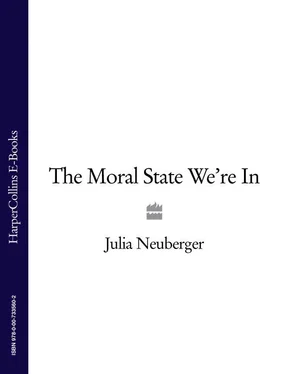Older people who are not dying of cancer, motor neurone disease, or AIDS/HIV often fail to benefit from Britain’s superb palliative care services. Yet death comes in many ways: we may die of heart disease, be it congestive heart failure or simply a fatal coronary infarct. We may die after being disabled in a severe way by a stroke, or by end-stage renal disease. We may have chronic obstructive pulmonary disease. We may have dementia. We may die of a single cause, or a combination of many, or we may simply die of old age. Yet the palliative care services are often not there for us, and whether we get access to them depends on the area in which we live.
With little trouble, and at relatively little cost, it should be possible to provide palliative care to people who are dying of whatever condition, in whatever setting. People dying in a nursing home should still get the specialist care that they would have received had they still been in their own homes. People dying in a care home should be just as entitled to a visit from the palliative care team as those who are living with a son or a daughter. If we could ensure that, as well as providing proper palliative care for those who have the misfortune to be dying in an acute hospital, some part of the fear of dying might be assuaged. Some principles could be established covering, for instance, privacy, good physical care and proper pain relief, a guarantee of not dying alone, choice of place of death, treatment choices (advance directives again), and who should be present when death finally comes. These principles would provide a kind of guarantee of respect for the person’s dignity and autonomy, as well as guaranteeing diminution of suffering, and respect for their autonomy, so that, insofar as is possible, people get the services they want when they are dying.
In the working paper of the health and social services group for Age Concern’s Millennium Debate of the Age, *which I chaired in the late 1990s, we identified twelve principles of a good death:
To know when death is coming and to understand what can be expected
To be able to retain control of what happens
To be afforded dignity and privacy
To have control over pain relief and other symptom control
To have choice and control over where death occurs (at home or elsewhere)
To have access to information and expertise of whatever kind is necessary
To have access to any spiritual or emotional support required
To have access to hospice care in any location, not only in hospital
To have control over who is present and who shares the end
To be able to issue advance directives which ensure wishes are respected
To have time to say goodbye, and control over other aspects of timing
To be able to leave when it is time to go, and not have life prolonged pointlessly
All these principles would make a real difference if they were generally implemented. In practice, it would not always be possible to carry out all of them for every person. But the hope and expectation that they would be put into practice would help dissipate the fear of dying.
It is no surprise that many older people fear the future. For many of them, the future is simply frightening, and current policies have done little to alleviate that fear, whatever we may say, or whatever Help the Aged and Age Concern try to argue. The situation is not good enough. Euthanasia is not the answer. Striving less hard to keep people alive, along with advance directives, may help a few. But they will not help the majority. So various things remain to be done.
First, there is clearly a need for an older people’s movement above and beyond what Help the Aged and Age Concern now do, a movement of older people that fights hard and dirty, and that makes government wake up to what older people are feeling. There is a real need for a grey-power movement to point out to government that the present settlement is neither fair nor acceptable and remind it of older people’s voting power. To some extent, this exists in the shape of the National Pensioners’ Convention and the redoubtable Rodney Bickerstaffe. But this movement needs to get much bigger and much angrier, and to show government that it really means business by being prepared to play dirty. Older people must complain.
Second, old age itself needs redefining. This not only concerns retirement age–though it is clear that we will all have to work longer, and possibly differently, in order to afford our pensions and our end of life care. It also involves the recognition that most of us are at the peak of our powers in our forties and fifties and that it is perfectly sensible–indeed, the Americans already do it–for us to switch to different, less demanding, jobs when we reach our late sixties and seventies. Retirement and activity in older age needs rethinking, and government cannot rely on older people’s goodwill for much longer.
Very old people need to be assured that they will have proper care, properly funded, when they need it–even if they have to bear some of the cost themselves. They need to be reassured about what their liabilities might be. This means accepting that we will need to pool the risk for some of their care, and old people need to know that society accepts their care as an obligation, and also that they will not be abused in care homes, or indeed in their own homes.
Care workers need to be treated with greater respect, receive more and better training, and to be paid more. It should be deemed just as honourable to be a care worker looking after older people as it is to be a doctor or nurse looking after children–and there may need to be new financial and status rewards to ensure this.
Older people need to know that they can control their own death when the time comes, and to be able to die at home, with all the information and support they require, if that is what they want. They need to know that they can make advance directives so that, if they are not able to make decisions themselves at the time, their wishes will still be carried out.
Older people need to know that there will be no discrimination against them in the provision of healthcare, that they will get what others get, subject to whether it seems sensible to them and their clinicians, and that they will be consulted every step of the way.
Finally, older people have a right to expect kindness and care from the rest of us–there are so many older people, and soon we will be amongst them. It should be part of what is expected of every citizen that, whilst he or she is able, they visit and generally look out for older people who are their neighbours.
*‘The Bremen Town Musicians’ (with thanks to the Brothers Grimm).
* Population Trends (summer 2004), no. 116.
†Department of Health, Departmental Report, 2004.
*N Salari, ‘Are health and care services ready for a surge in Alzheimer’s
†N. Pettinger, ‘Age-old myths’, HSJ (27 August 1998).
* Simplicity, Security and Choice: Working and saving for retirement , Department of Work and Pensions (December 2002).
*Ben Richardson, BBC News Online (16 June 2004).
†N. Gillies and N. MacErlean, ‘Tell me the old, old story’, The Guardian (23 July 2000).
‡H. Mulholland. ‘Fifty reasons to be cheerful’, The Guardian (3 April 2000).
*Keizer, B. (1997).
*Age Concern Fact Sheet 10, Local Authority Charging Procedures for Care Homes , issued April 2004, updated June 2004.
*Archbishop Rowan Williams, as quoted by the Independent Catholic News (2 June 2003).
*Kathryn Wilmington, Policy Officer, Community, Health and Social Care (6 June 2003).
†From the website of the National Council for Hospice and Specialist Palliative Care (10 May 2004).
Читать дальше






![Nicholas Timmins - The Five Giants [New Edition] - A Biography of the Welfare State](/books/701739/nicholas-timmins-the-five-giants-new-edition-a-thumb.webp)





